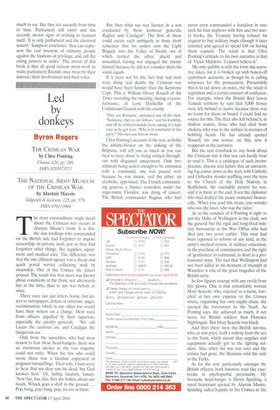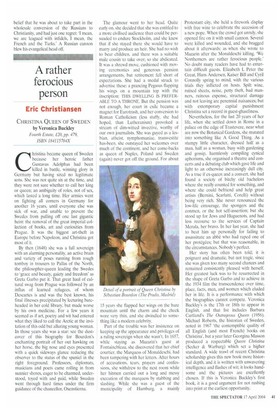Led by donkeys
Byron Rogers
THE CRIMEAN WAR by Clive Panting Chatto, £20, pp. 280, ISBN 0283073551 THE NATIONAL ARMY MUSEUM OF THE CRIMEAN WAR by Alastair Massie Sidgwick &Jackson, £25, pp. 379, ISBN 070113904 The most extraordinary single detail about the Crimean war occurs in Alastair Massie's book. It is this: the dim lordlings who commanded on the British side had forgotten to impose censorship on private mail, just as they had forgotten other things, like supplies, equipment and medical care. The difference was that the one efficient agency was a cheap and quick postal service collecting mail by steamship. Out of the Crimea the letters poured. The result was that more was known about conditions at the front, not afterwards but at the time, than in any war before or since.
There were not just letters home, but letters to newspapers, letters of criticism, anger, recrimination, which in any other war would have their writers on a charge. Most were from officers appalled by their superiors, especially the cavalry generals. 'We call Lucan the cautious ass, and Cardigan the dangerous ass.'
Only from the squaddies, who had most reason to fear those head-bangers, there was 1 an enormous silence as the vast majority could not write. When the few who could wrote there was a fatalism expressed in poignant misspellings. 'Dear wife, I ham sorry to hear that my dear son his dead, but God knowes best.' Or, failing fatalism, lunacy. 'Now fizz, fizz, fizz, flies the bullets about our heads. Whack goes a shell in the ground .... Pop, bang, pop, bang, pop, we are at them.'
But then what use was literacy in a war conducted by those knitwear generals, Raglan and Cardigan? The first of these could create such ambiguity in three short sentences that his orders sent the Light Brigade into the Valley of Death, out of which trotted the other, placid and unscathed, having not engaged the enemy himself because he did not consider them his social equals.
[fit were not for the fact that real men were dying real deaths the Crimean war would have been funnier than the Keystone Cops. This is William Henry Russell of the Times recording the meeting, during a reconnaissance, of Lord Dunkellin of the Coldstream Guards with the enemy.
'They are Russians', exclaimed one of the men. 'Nonsense, they're our fellows,' said his lordship, and off he trotted towards them, asking in a high tone as he got near, 'Who is in command of this party?' His men saw him no more.
Clive Ponting's account of the war, as befits the whistle-blower on the sinking of the Beiginno, will tell you as much as you can bear to hear about it. being written throughout with disgusted amazement. Only two admirals being senior enough to be entrusted with a command, one was passed over because he was insane, and the other, an alcoholic, appointed. The French commanding general, a former comedian under the stage-name Floridor, was dying of cancer. The British commander Raglan, who had
never even commanded a battalion in war, took his four nephews with him and two travel books, the Treasury having refused his request to buy military maps (though it later relented and agreed to spend £48 on having them copied). The result is that Clive Ponting's attitude to his own narrative is that of Victor Meldrew: 'I cannot believe it.'
My only quibble is with the form this narrative takes, for it is broken up with boxed-off eyewitness accounts, as though he is calling witnesses for the prosecution. Presumably this is to cut down on notes, but the result is repetition and a certain amount of confusion. For example, when the British fleet leaves Turkish territory he says that 5,000 horses were left behind to starve because there was no room for them on board. [could find no source for this. The fleet also left behind it, in shallow waters, those who had died from cholera, who rose to the surface in avenues of bobbing heads. He has already quoted Russell, his one source, on this; now it reappears in the narrative.
But the real drawback to any book about the Crimean war is that you can hardly bear to read it. This is a catalogue of such incompetence, disease and failure that an unrelenting fog comes down at the start, with Catholic and Orthodox monks scuffling over the keys to the Church of the Holy Nativity in Bethlehem, the ostensible pretext for war, and it is there at the end. Even the diplomat who had drafted the peace muttered bemusedly, 'When you read this treaty, you wonder who was the loser, who was the victor.'
As to the conduct of it Ponting is right to put the Duke of Wellington in the dock, not the general but the rigid and long-lived military bureaucrat at the War Office who had died just two years earlier. This man had been opposed to reform of any kind, in the army's medical system, in military education, in the purchase of commissions, and the right of 'gentlemen' to command, in short to a professional army. The fact that Wellington had not been killed in his moment of triumph at Waterloo is one of the great tragedies of the British army.
So few figures emerge with any credit from this gloom. One is that remarkable woman Mary Seacole, who, rejected as a nurse, travelled at her own expense to the Crimea where, organising her own supply chain, she opened the forerunner to the Naafi. As Ponting says, she achieved as much, if not more, for British soldiers than Florence Nightingale. But Mary Seacole was black.
And then there were the British navvies, who, at cost price, built a railway from the sea to the front, which meant that supplies and equipment actually got to the fighting soldiers. Alas, when the war was over and the armies had gone, the Russians sold the rails to the Turks.
As for the rest, particularly amongst the British officers, both histories read like casebooks in psychopathic personality. My favourite head-banger is Henry Spalding, a naval lieutenant quoted by Alastair Massie.
• Spalding sailed happily to the Crimea in the belief that he was about to take part in the wholesale conversion of the Russians to Christianity, and had just one regret: 'I mean, we are leagued with infidels, I mean, the French and the Turks.' A Russian cannon blew his evangelical head off.



































































 Previous page
Previous page